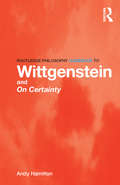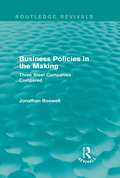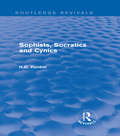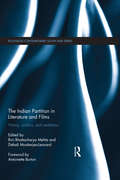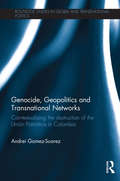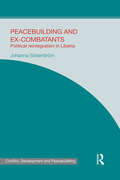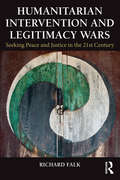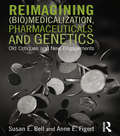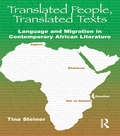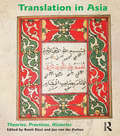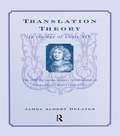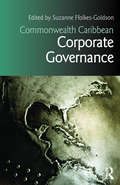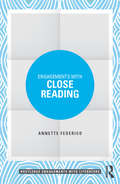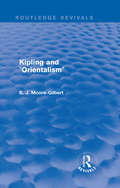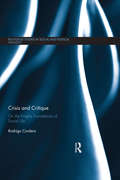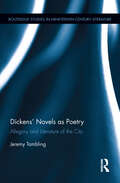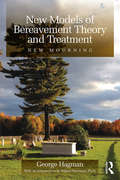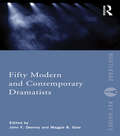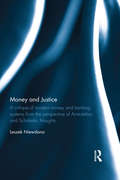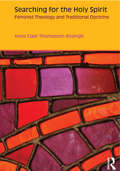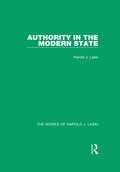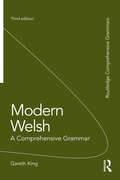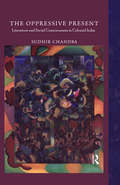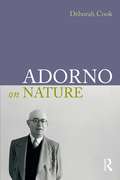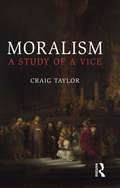Special Collections
Benetech’s Global Certified Accessible Titles
Description: Benetech’s GCA program is the first independent third-party EPUB certification to verify ebook accessibility. By creating content that is born accessible, publishers can meet the needs of all readers. Learn more: https://bornaccessible.benetech.org/
- Table View
- List View
Routledge Philosophy GuideBook to Wittgenstein and On Certainty
by Andy HamiltonLudwig Wittgenstein is arguably the most important philosopher of the twentieth century. In On Certainty he discusses central issues in epistemology, including the nature of knowledge and scepticism. The Routledge Philosophy Guidebook to Wittgenstein and On Certainty introduces and assesses: Wittgenstein's career and the background to his later philosophy the central ideas and text of On Certainty, including its responses to G.E. Moore and discussion of fundamental issues in the theory of knowledge Wittgenstein's continuing importance in contemporary philosophy. This GuideBook is essential reading for all students of Wittgenstein, and for those studying epistemology and philosophy of language. On Certainty, Wittgenstein's final work, addresses a category of "world-picture" propositions discovered by G.E. Moore. These challenge Wittgenstein's enduring commitment to a well-defined category of empirical propositions, and help to generate a critique of scepticism. Developing Wittgenstein's view that scepticism is self-undermining, the Guidebook offers a combative yet therapeutic interpretation that locates On Certainty between the standpoints of Kant and Hume.
Business Policies in the Making
by Jonathan BoswellFirst published in 1983, this study investigates and compares three leading firms in the British iron and steel industry between 1914 and 1939, analysing their strategies, boardroom politics, and their responses to the problems posed by the Great War and by the vicissitudes of the 1920s and ‘30s. Jonathan Boswell illuminates certain issues that are of perennial importance for students of business: rationality and ‘error’ in decision-making, ethics, centralisation versus decentralisation, and the question of cyclical phases. The central theme throughout is the pursuit of three partly conflicting objectives: growth, efficiency and social action. The trade-offs between these three pursuits are used to examine significant contrasts in corporate strategies and behaviour, including towards government and public opinion. Boswell’s rejection of economic determinism; his insistence that managerial influences fall into definable long-run patterns; and his theses on managerial specialisation and long-term policy biases confront fundamental issues for theories of the firm.
Sophists, Socratics and Cynics
by David RankinThe Sophists, the Socratics and the Cynics had one important characteristic in common: they mainly used spoken natural language as their instrument of investigation, and they were more concerned to discover human nature in its various practical manifestations than the facts of the physical world. The Sophists are too often remembered merely as the opponents of Socrates and Plato. Rankin discusses what social needs prompted the development of their theories and provided a market for their teaching. Five prominent Sophists – Protagoras, Gorgias, Prodicus, Hippias and Thrasymachus – are looked at individually. The author discusses their origins, aims and arguments, and relates the issues they focussed on to debates apparent in contemporary literature. Sophists, Socratics and Cynics, first published in 1983, also traces the sophistic strand in Greek thought beyond the great barrier of Plato, emphasising continuity with the Cynics, and concludes with a look forward to Epicureans and Stoics.
The Indian Partition in Literature and Films
by Debali Mookerjea-Leonard and Rini Bhattacharya MehtaThis book presents an examination of fictional representations, in books and films, of the 1947 Partition that led to the creation of the sovereign nation-states of India and Pakistan. While the process of representing the Partition experience through words and images began in the late 1940s, it is only in the last few decades that literary critics and film scholars have begun to analyse the work. The emerging critical scholarship on the Partition and its aftermath has deepened our understanding of the relationship between historical trauma, collective memory, and cultural processes, and this book provides critical readings of literary and cinematic texts on the impact of the Partition both in the Punjab and in Bengal. The collection assembles studies on Anglophone writings with those on the largely unexplored vernacular works, and those which have rarely found a place in discussions on the Partition. It looks at representations of women’s experiences of gendered violence in the Partition riots, and how literary texts have filled in the lack of the ‘human dimension’ in Partition histories. The book goes on to highlight how the memory of the Partition is preserved, and how the creative arts’ relation to public memory and its place within the public sphere has changed through time. Collectively, the essays present a nuanced understanding of how the experience of violence, displacement, and trauma shaped postcolonial societies and subjectivities in the Indian subcontinent. Mapping the diverse topographies of Partition-related uncertainties and covering both well-known and lesser-known texts on the Partition, this book will be a useful contribution to studies of South Asian History, Asian Literature and Asian Film.
Genocide, Geopolitics and Transnational Networks
by Andrei Gomez-SuarezThis volume seeks to uncover and discuss the links between genocide, geopolitics and transnational networks. By studying the destruction of the Union Patrotica (UP) in Colombia - a process usually regarded as one of the extreme by-products of the Colombian armed conflict- through the lens of genocide studies, Gomez-Suarez challenges mainstream international relations, genocide and Colombian armed conflict studies. Moving beyond the analysis of the Colombian case, the book offers a broader interdisciplinary theoretical framework that also attends to transnational relations of perpetrators and resisters and the political economy of affective-dispositions for mapping genocidal conjuncture. Methodologically, the text aims to present a re-interpretation of what constitutes genocide beyond its legal definition and turn towards its political and ethical dimensions to create a conceptual framework in which genocide appears to turn ever more into a decentralized network of various actors that contributed to a genocidal mentality, which, ultimately, enable the destruction of the civil society networks. This work will be an important contribution to both the debates on genocide and international relations and the study of global connectivities.
Peacebuilding and Ex-Combatants
by Johanna SöderströmThe book examines how ex-combatants in post-war and peacebuilding settings engage in politics, as seen in the case of Liberia. The political mobilization of former combatants after war is often perceived as a threat, ultimately undermining the security and stability of the state. This book questions this simplified view and argues that understanding the political voice of former combatants is imperative. Their post-war role is not black and white; they are not just bad or good citizens, but rather engage in multiple political roles: spoilers, victims, disengaged, beneficiaries, as well as motivated and active citizens. By looking at the political attitudes and values of former combatants, and their understanding of how politics functions, the book sheds new light on the political reintegration of ex-combatants. It argues that political reintegration needs to be given serious attention at the micro-level, but also needs to be scrutinized in two ways: first, through the level of political involvement, which reflects the extent and width of the ex-combatants’ voice. Second, in order to make sense of political reintegration, we also need to uncover what values and norms inform their political involvement. The content of their political voice is captured through a comparison with democratic ideals. Based on interviews with over 100 Liberian ex-combatants, the book highlights that their relationship with politics overall should be characterized as an expression of a 'politics of affection'. This book will be of much interest to students of peacebuilding, African politics, democratization, political sociology, conflict resolution and IR/Security Studies in general.
Humanitarian Intervention and Legitimacy Wars
by Richard FalkIn the aftermath of the Cold War there has been a dramatic shift in thinking about the maintenance of peace and security on a global level. This shift is away from a preoccupation with how to prevent major wars between sovereign states to a preoccupation about non-state transnational warfare and violence and strife within states in a world order that continues to be juridically and politically delimited by spatial ideas of national sovereignty and national independence as signified by international boundaries. In this book, Richard Falk draws upon these changes to examine the ethics and politics of humanitarian intervention in the 21st Century. As well as analysing the theoretical and conceptual basis of the responsibility to protect, the book also contains a number of case studies looking at Iraq, Afghanistan, Kosovo and Syria. The final section explores when humanitarian intervention can succeed and the changing nature of international political legitimacy in countries such as India, Tibet, South Africa and Palestine. This book will be of interest to students of International Relations theory, Peace Studies and Global Politics.
Reimagining (Bio)Medicalization, Pharmaceuticals and Genetics
by Susan E. Bell and Anne E. FigertIn recent years medicalization, the process of making something medical, has gained considerable ground and a position in everyday discourse. In this multidisciplinary collection of original essays, the authors expertly consider how issues around medicalization have developed, ways in which it is changing, and the potential shapes it will take in the future. They develop a unique argument that medicalization, biomedicalization, pharmaceuticalization and geneticization are related and co-evolving processes, present throughout the globe. This is an ideal addition to anthropology, sociology and STS courses about medicine and health.
Translated People,Translated Texts
by Tina SteinerTranslated People, Translated Texts examines contemporary migration narratives by four African writers who live in the diaspora and write in English: Leila Aboulela and Jamal Mahjoub from the Sudan, now living in Scotland and Spain respectively, and Abdulrazak Gurnah and Moyez G. Vassanji from Tanzania, now residing in the UK and Canada. Focusing on how language operates in relation to both culture and identity, Steiner foregrounds the complexities of migration as cultural translation. Cultural translation is a concept which locates itself in postcolonial literary theory as well as translation studies. The manipulation of English in such a way as to signify translated experience is crucial in this regard. The study focuses on a particular angle on cultural translation for each writer under discussion: translation of Islam and the strategic use of nostalgia in Leila Aboulela's texts; translation and the production of scholarly knowledge in Jamal Mahjoub's novels; translation and storytelling in Abdulrazak Gurnah's fiction; and translation between the individual and old and new communities in Vassanji's work. Translated People, Translated Texts makes a significant contribution to our understanding of migration as a common condition of the postcolonial world and offers a welcome insight into particular travellers and their unique translations.
Translation in Asia
by Ronit Ricci and Jan van der PuttenThe field of translation studies was largely formed on the basis of modern Western notions of monolingual nations with print-literate societies and monochrome cultures. A significant number of societies in Asia – and their translation traditions – have diverged markedly from this model. With their often multilingual populations, and maintaining a highly oral orientation in the transmission of cultural knowledge, many Asian societies have sustained alternative notions of what ‘text’, ‘original’ and ‘translation’ may mean and have often emphasized ‘performance’ and ‘change’ rather than simple ‘copying’ or ‘transference’. The contributions in Translation in Asia present exciting new windows into South and Southeast Asian translation traditions and their vast array of shared, inter-connected and overlapping ideas about, and practices of translation, transmitted between these two regions over centuries of contact and exchange. Drawing on translation traditions rarely acknowledged within translation studies debates, including Tagalog, Tamil, Kannada, Malay, Hindi, Javanese, Telugu and Malayalam, the essays in this volume engage with myriad interactions of translation and religion, colonialism, and performance, and provide insight into alternative conceptualizations of translation across periods and locales. The understanding gained from these diverse perspectives will contribute to, complicate and expand the conversations unfolding in an emerging ‘international translation studies’.
Translation Theory in the Age of Louis XIV
by James Albert DeLaterPreeminent in a relatively rare category of separate early modern treatises on translation, the 1683 De optimo genere interpretandi by the polymath cleric Pierre-Daniel Huet (1630-1721) offers a concise introduction to its nature, history, theory, process and practice. Written in the form of a Ciceronian dialogue, On the best kind of translating not only represents Huet's acute and witty defence of the often disparaged literal or word for word model, but also provides illuminating glimpses into the critical and interpretive methods of his age. A guiding premise of this first modern edition and annotated translation of Huet's entire treatise is that, now as then, translation theory and practice are complementaries. Consistent also with this premise is the conscious attempt by DeLater to apply Huet's literal translation model at every stage in the process of producing this annotated translation of his treatise. Among the topics treated in Huet's work are: (1) a definition of translation and its relationship to interpretation; (2) adaptation of translation aims and methods to the subject matter of the original; (3) the translating and glossing of idioms, proverbs, metaphors, puns and ambiguities; (4) translators' priorities, from sense and words to the elusive quality that makes a translation seem an original work; and (5) translation as an independent theoretical discipline. In addition to providing an introduction to Huet's life and works as well as explanatory glosses for his copious sources and various topics in the DOGI, the present work also supplies links between Huet's work and that of current theorists and critics in the field of translation studies.
Commonwealth Caribbean Corporate Governance
by Suzanne Ffolkes-GoldsonCorporate governance initiatives have been developing at a rapid pace in the Commonwealth Caribbean through legislation, case law and codes. Commonwealth Caribbean Corporate Governance offers an overview of current practice and legal developments in corporate governance, highlighting the interpretation of the legislation through case law and the codes of corporate governance which have now been implemented. It also considers the challenges which emerging markets face in an attempt to adopt the corporate governance initiatives of developed markets. This text explores the emergence and development of corporate governance in the region from a range of angles, including the protection and empowerment of shareholders, the impact on government agencies, and the role and responsibilities of directors and officers in companies and in government agencies. Written by a panel of academics, legal practitioners and experts working in business, this book will be an invaluable resource for judges, lawyers, corporate executives and students of business, corporate law and corporate management.
Engagements with Close Reading
by Annette FedericoWhat should we do with a literary work? Is it best to become immersed in a novel or poem, or is our job to objectively dissect it? Should we consult literature as a source of knowledge or wisdom, or keenly interrogate its designs upon us? Do we excavate the text as an historical artifact, or surrender to its aesthetic qualities? Balancing foundational topics with new developments, Engagements with Close Reading offers an accessible introduction to how prominent critics have approached the task of literary reading. This book will help students learn different methods for close reading perform a close analysis of an unfamiliar text articulate meaningful responses Beginning with the New Critics and recent argument for a return to formalism, the book tracks the reactions of reader-response critics and phenomenologists, and concludes with ethical criticism’s claim for the value of literary reading to our moral lives. Rich in literary examples, most reprinted in full, each chapter models practical ways for students to debate the pros and cons of objective and subjective criticism. In the final chapter, five distinguished critics shed light on the pleasures and difficulties of close reading in their engagements with poetry and fiction. In the wake of cultural studies and historicism, Engagements with Close Reading encourages us to bring our eyes back to the words on the page, inviting students and instructors to puzzle out the motives, high stakes, limitations, and rewards of the literary encounter under the pressure of this beleaguered and persistent methodology.
Kipling and Orientalism
by B. J. Moore-GilbertFirst published in 1986, this book sets Kipling firmly in the historical context not only of contemporary India but of prior Anglo-Indian writers about India. Despite his enthusiastic reception in England as ‘revealer of the East’, in India he seems to have been regarded as just one more Anglo-Indian writer. The author demonstrates the traditionalism of Kipling’s use of the themes of Anglo-Indian fiction – themes such as the ‘White Man’s grave’, domestic instability, frustration and loneliness. In particular, Kipling is shown to be writing in a strongly conservative idiom, concentrating on the role of the British hierarchy as the determining factor in a response to India, on British insecurity and fears of a repeat of the 1857 mutiny, and regarding Indian institutions only in so far as they represented a threat to British rule. Conservative critiques of liberalism are also discussed.
Crisis and Critique
by Rodrigo CorderoFragility is a condition that inhabits the foundations of social life. It remains mostly unnoticed until something breaks and dislocates the sense of completion. In such moments of rupture, the social world reveals the stuff of which it is made and how it actually works; it opens itself to question. Based on this claim, this book reconsiders the place of the notions of crisis and critique as fundamental means to grasp the fragile condition of the social and challenges the normalization and dissolution of these ‘concepts’ in contemporary social theory. It draws on fundamental insights from Hegel, Marx, and Adorno as to recover the importance of the critique of concepts for the critique of society, and engages in a series of studies on the work of Habermas, Koselleck, Arendt, and Foucault as to consider anew the relationship of crisis and critique as immanent to the political and economic forms of modernity. Moving from crisis to critique and from critique to crisis, the book shows that fragility is a price to be paid for accepting the relational constitution of the social world as a human domain without secure foundations, but also for wishing to break free from all attempts at giving closure to social life as an identity without question. This book will engage students of sociology, political theory and social philosophy alike.
Dickens' Novels as Poetry
by Jeremy TamblingFocusing on the language, style, and poetry of Dickens’ novels, this study breaks new ground in reading Dickens’ novels as a unique form of poetry. Dickens’ writing disallows the statement of single unambiguous truths and shows unconscious processes burrowing within language, disrupting received ideas and modes of living. Arguing that Dickens, within nineteenth-century modernity, sees language as always double, Tambling draws on a wide range of Victorian texts and current critical theory to explore Dickens’ interest in literature and popular song, and what happens in jokes, in caricature, in word-play and punning, and in naming. Working from Dickens’ earliest writings to the latest, deftly combining theory with close analysis of texts, the book examines Dickens’ key novels, such as Pickwick Papers, Martin Chuzzlewit, Dombey and Son, Bleak House, Little Dorrit, Great Expectations, and Our Mutual Friend. It considers Dickens as constructing an urban poetry, alert to language coming from sources beyond the individual, and relating that to the dream-life of characters, who both can and cannot awake to fuller, different consciousness. Drawing on Walter Benjamin, Lacan, and Derrida, Tambling shows how Dickens writes a new and comic poetry of the city, and that the language constitutes an unconscious and secret autobiography. This volume takes Dickens scholarship in exciting new directions and will be of interest to all readers of nineteenth-century literary and cultural studies, and more widely, to all readers of literature.
New Models of Bereavement Theory and Treatment
by George HagmanHonoring the centennial of Sigmund Freud’s seminal paper Mourning and Melancholia, New Models of Bereavement Theory and Treatment: New Mourning is a major contribution to our culture’s changing view of bereavement and mourning, identifying flaws in old models and offering a new, valid and effective approach. George Hagman and his fellow contributors bring together key psychoanalytic texts from the past 20 years, exploring contemporary research, clinical practice and model building relating to the problems of bereavement, mourning and grief. They propose changes to the asocial, intra-psychic nature of the standard analytic model of mourning, changes compatible with contemporary psychoanalytic theory and practice. Arguing that the most important goal of mourning is often to preserve, rather than give up the relationship to the deceased, this book provides a more positive, hopeful model. Crucially, it emphasizes the importance of mourning together, rather than alone. New Models of Bereavement Theory and Treatment: New Mourning will be the go-to resource for researchers, clinicians and interested lay people seeking a clear, accessible overview of contemporary mourning theory, useful in their daily lives and in clinical practice. It will appeal to psychoanalysts, psychotherapists, grief counsellors, as well teachers, undergraduates and advanced students studying in the field.
Fifty Modern and Contemporary Dramatists
by Maggie B. Gale and John F. DeeneyFifty Modern and Contemporary and Dramatists is a critical introduction to the work of some of the most important and influential playwrights from the 1950s to the present day. The figures chosen are among the most widely studied by students of drama, theatre and literature and include such celebrated writers as: • Samuel Beckett • Caryl Churchill • Anna Deavere Smith • Jean Genet • Sarah Kane • Heiner Müller • Arthur Miller • Harold Pinter • Sam Shephard Each short essay is written by one of an international team of academic experts and offers a detailed analysis of the playwright’s key works and career. The introduction provides an historical and theatrical context to the volume, which provides an invaluable overview of modern and contemporary drama.
Money and Justice
by Leszek NiewdanaMoney has always represented power. For Aristotle, this power was inseparable from the exercise of justice within a community. This is why issuance of money was the prerogative of the lawful authority (government). Such a view of monetary power was widespread, and includes societies as distant as China. Over the past several centuries, however, private interests increasingly tapped into the exercise of the money power. Through gradual shifts, commercial banks have gained a legally protected right to create money through issuance of debts. The aim of this book is to unravel various layers hiding the real workings of modern money and banking systems and injustices ingrained in them. By asking what money really is, who controls it and for what purpose (why), the book provides insight into understanding of modern money and banking systems, as well as the causes of growing financialization of economies throughout the world, money manias and economic instability. The book also increases the awareness of injustices hidden in the workings of modern money and banking systems and the need for moral underpinnings of such systems. Finally, it suggests a money system which could immensely improve human, economic, and ecological conditions.
Searching for the Holy Spirit
by Anne Claar Thomasson-RosinghIs the doctrine of the Holy Spirit in Christian theology good news or bad news for women? Is the Holy Spirit in traditional Christian doctrine the guardian of the status quo or does it offer the dynamic possibility for change? How do the gifts of the Spirit, ecstatic and relational, inform feminist thinking of the Christian God. Opinions on these key questions vary wildly but are often formulated without coherent theological argument. Feminist theology has a history of questioning God the Father and God the Son - this study begins the theological questioning of God the Holy Spirit. Searching for the Holy Spirit brings feminist pneumatology into discussion with more traditional doctrine of the Spirit, notably the very significant early Christian treatise by Basil of Caesarea, De Spiritu Sancto. The results offer exciting new possibilities for both theology and the place of women in the church.
Authority in the Modern State
by Harold J. LaskiAs a sequel to Studies in the Problem of Sovereignty, this volume, originally published in 1919, expands Laski’s pluralist doctrine of the state, (using France as its reference) but covers rather broader ground, since its main object is to insist that the problem of sovereignty is only a special case of the problem of authority. The result is a positive, constructive analysis of politics and the theory of the state which examines the division and organisation of power, the limitations of power and the significance of freedom, the political theory of Bonald, the revival of traditionalism and the role of the Church and the Civil Service.
Modern Welsh
by Gareth KingModern Welsh: A Comprehensive Grammar is the ideal reference source for all speakers and learners of Welsh. Focusing on contemporary spoken Welsh, it presents the complexities of the language in a concise and readable form. Common grammatical patterns and parts of speech are discussed in detail and without jargon and extensive cross references make the book comprehensive and easy to use. Now in its third edition, the Grammar has been thoroughly revised and updated throughout. Changes include an increased number of illustrative examples, additional appendices for easy reference, inclusion of IPA phonetic symbols, and expanded sections on further reading. Features include: Full use of authentic examples Particular attention to areas of confusion and difficulty Extensive index and cross referencing Initial consonant mutations marked throughout Separate sections on communicative functions Notes on variation between dialects and on formal written language Modern Welsh: A Comprehensive Grammar is the most thorough, detailed and user-friendly Welsh grammar available in English today. It is suitable for use in schools, colleges, universities and adult classes at all levels and will, as its predecessors, prove an invaluable aid for Welsh language learning and teaching.
The Oppressive Present
by Sudhir ChandraMarking a departure from studies on history and literature in colonial India, The Oppressive Present explores the emergence of social consciousness as a result of and in response to the colonial mediation in the late nineteenth century. In focusing on contemporary literature in Hindi, Bengali, Gujarati, and Marathi, it charts an epochal change in the gradual loss of the old pre-colonial self and the configuration of a new, colonized self. It reveals that the ‘oppressive present’ of generations of subjugated Indians remains so for their freed descendants: the consciousness of those colonized generations continues to characterize the ‘modern educated Indian’. The book proposes ambivalence rather than binary categories — such as communalism and nationalism, communalism and secularism, modernity and tradition — as key to understanding the making of this consciousness. This cross-disciplinary volume will prove essential to scholars and students of modern and contemporary Indian history and society, comparative literature and post-colonial studies.
Adorno on Nature
by Deborah CookDecades before the environmental movement emerged in the 1960s, Adorno condemned our destructive and self-destructive relationship to the natural world, warning of the catastrophe that may result if we continue to treat nature as an object that exists exclusively for our own benefit. "Adorno on Nature" presents the first detailed examination of the pivotal role of the idea of natural history in Adorno's work. A comparison of Adorno's concerns with those of key ecological theorists - social ecologist Murray Bookchin, ecofeminist Carolyn Merchant, and deep ecologist Arne Naess - reveals how Adorno speaks directly to many of today's most pressing environmental issues. Ending with a discussion of the philosophical conundrum of unity in diversity, "Adorno on Nature" also explores how social solidarity can be promoted as a necessary means of confronting environmental problems.
Moralism
by Craig TaylorMoralism involves the distortion of moral thought, the distortion of reflection and judgement. It is a vice, and one to which many - from the philosopher to the media pundit to the politician - are highly susceptible. This book examines the nature of moralism in specific moral judgements and the ways in which moral philosophy and theories about morality can themselves become skewed by this vice. This book ranges across a wide range of topics: the problem of the demandingness of morality; the conflict between moral and other values; the contrast between the practice of moral philosophy and other modes of moral thought or reflection; moralism in the media; and, moralism in the public discussion of literature and art. This highly original and provocative book will be of interest to students of philosophy, psychology, theology and media, and to anyone who takes a serious interest in contemporary morality.
